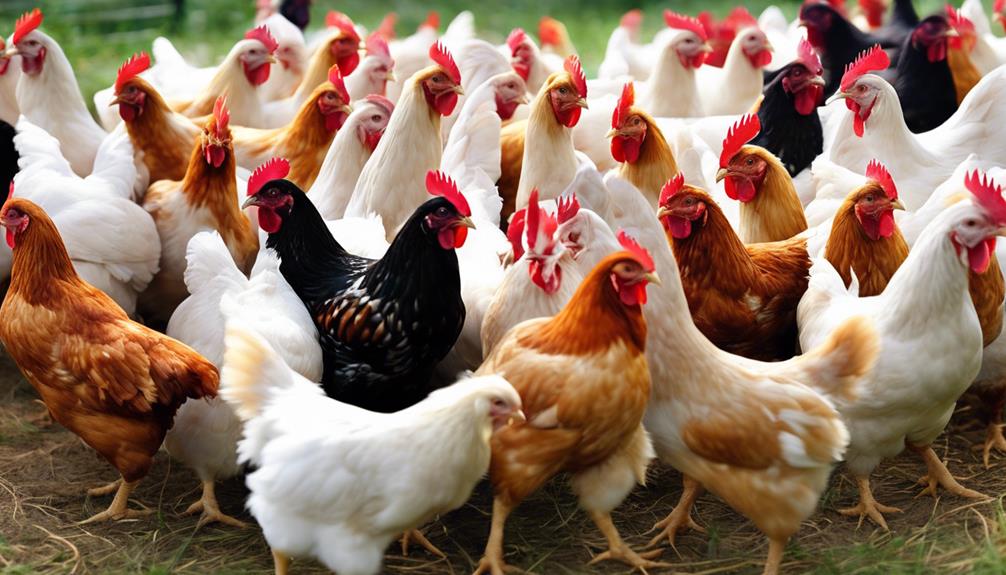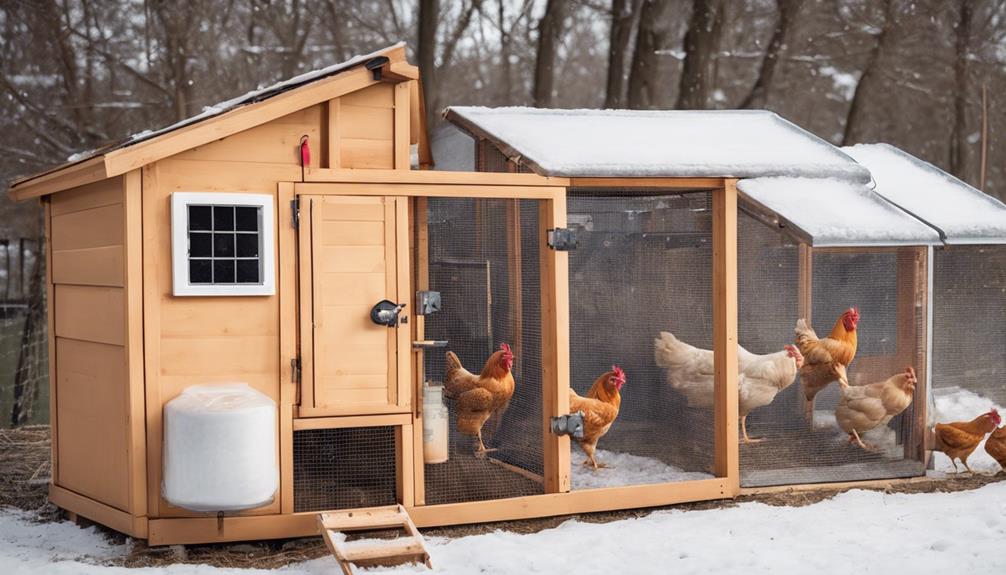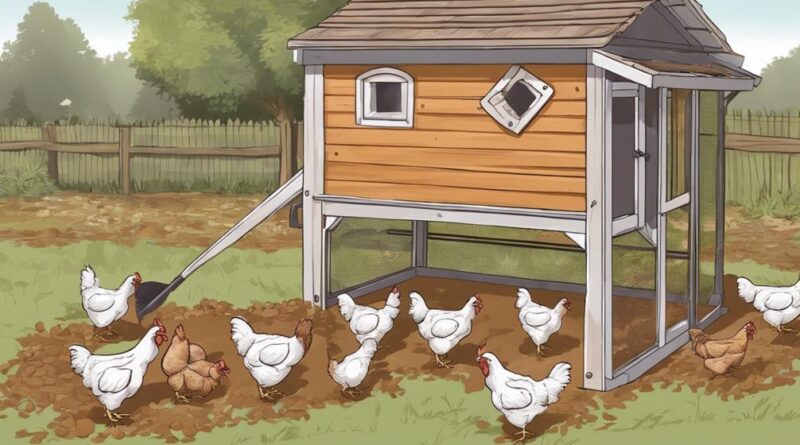10 Easy DIY Techniques for Successful Chicken Farming"
When it comes to mastering the art of chicken farming, having a solid foundation is key. Imagine a world where your coop is a fortress of comfort, your feed is a feast of health, and pests are mere whispers in the wind. These 10 easy DIY techniques hold the potential to transform your chicken farm into a well-oiled machine of productivity and contentment. But where do you start? Let's unravel the secrets together…
Chicken Coop Construction
When constructing a chicken coop, ensure you use durable materials that can withstand various weather conditions and provide adequate protection for your poultry. For roofing options, consider using corrugated metal sheets or asphalt shingles. These materials are durable, weather-resistant, and provide good insulation. Proper ventilation techniques are crucial to maintain a healthy environment for your chickens. Install windows that can be opened and closed to regulate airflow. Additionally, you can incorporate vents near the roof to allow hot air to escape during the summer months.
When it comes to flooring choices, using materials like gravel or sand can help with drainage and cleanliness. These materials are easy to clean and replace when needed. For the nesting box design, ensure they're elevated off the ground to prevent pests from getting in. Provide adequate bedding such as straw or wood shavings for comfort and insulation. The nesting boxes should be dark and secluded to encourage egg-laying.
Natural Feed Formulation
To create a balanced and nutritious diet for your chickens, consider formulating natural feeds using a variety of ingredients rich in essential nutrients. Natural feed formulation plays a crucial role in promoting egg production and maintaining the overall health of your flock. Here are some key points to keep in mind:
- Diverse Ingredients: Incorporate a mix of grains, seeds, vegetables, and fruits to ensure your chickens receive a wide range of nutrients essential for their health and egg production.
- Protein Sources: Include protein-rich sources such as soybean meal, fish meal, or dried insects to support muscle development and egg formation in your hens.
- Calcium Supplements: Provide calcium supplements like crushed oyster shells or limestone to help in the formation of strong eggshells, preventing issues like thin-shelled eggs or shell deformities.
Achieving the right balance of nutrients in your chickens' diet is essential for maximizing egg production and maintaining their well-being. By formulating natural feeds that are rich in essential nutrients, you can support your chickens' health and ensure a steady supply of fresh, high-quality eggs. Remember, a well-rounded diet not only benefits egg production but also contributes to the overall vitality of your flock.
Pest Control Methods
How can you effectively implement pest control methods to safeguard your chicken farm from potential threats? Pest control is crucial in maintaining a healthy environment for your chickens. There are two main methods you can utilize: biological control and chemical treatment.
Biological control involves the use of natural predators or parasites to manage pest populations. For example, introducing beneficial insects like ladybugs or parasitic wasps can help control common pests such as mites or flies. Another effective biological control method is encouraging native birds like swallows or sparrows to nest near your farm, as they can help keep insect populations in check.
When it comes to chemical treatment, it's essential to use products that are safe for both your chickens and the environment. Consult with a veterinarian or poultry health expert to determine the most suitable and effective pesticides for your specific pest issues. Always follow the instructions carefully and apply these chemicals in a targeted manner to minimize any potential risks to your flock.
Integrating a combination of biological control methods and chemical treatments, when necessary, can help you effectively manage pest infestations on your chicken farm. Regular monitoring and proactive measures are key to preventing pest-related problems and ensuring the well-being of your birds.
Watering System Setup
Implementing an efficient watering system setup is essential for maintaining proper hydration levels for your chickens on the farm. To ensure your poultry has constant access to clean water, follow these steps for a successful DIY watering system:
- Choose the Right Equipment: Select high-quality materials such as PVC pipes, water nipples, and containers that are durable and easy to clean. Avoid using materials that can easily harbor bacteria or algae growth.
- Proper Placement: Install the watering system at an appropriate height to prevent contamination from dirt or droppings. Position the water containers in a way that's easily accessible to all chickens in the coop.
- Regular Maintenance: Inspect the watering system regularly to check for leaks, blockages, or any signs of wear and tear. Clean the system thoroughly to prevent the buildup of dirt or debris that could affect water quality.
Egg Collection Tips
For efficient egg collection on your chicken farm, proper handling and storage are crucial aspects to ensure the quality of your eggs. Setting up nesting boxes in a quiet and secluded area of the coop encourages hens to lay eggs in a clean and safe environment. Make sure the nesting boxes are lined with clean bedding such as straw or shavings to provide a comfortable spot for your hens to lay their eggs. Check the nesting boxes regularly to collect eggs promptly and minimize the chances of breakage or contamination.
When collecting eggs, handle them gently to prevent cracks or damage to the shells. It's best to collect eggs at least twice a day to ensure they're fresh and clean. Avoid washing eggs unless absolutely necessary, as the protective coating on the shells can be compromised, making the eggs more susceptible to bacteria. If you must wash eggs, use warm water that's slightly warmer than the egg itself and dry them thoroughly before storage.
Proper egg storage is essential to maintain their freshness. Store eggs pointed end down in clean cartons or egg trays in a cool and humid-free environment. Ideally, the storage area should maintain a temperature of around 45-50°F (7-10°C) and a humidity level of 70-80%. Following these egg collection tips will help you maintain high-quality eggs on your chicken farm.
Health Monitoring Strategies
To effectively maintain the well-being of your flock, implementing proactive health monitoring strategies is essential on your chicken farm. Regular health checks and early detection of any issues can help prevent the spread of diseases and ensure your chickens lead healthy lives. Here are some key strategies to consider:
- Regular Health Inspections: Conduct routine health inspections on each chicken to check for signs of illness, injury, or parasites. Look for symptoms such as lethargy, abnormal droppings, coughing, sneezing, or changes in appetite. Early detection can significantly impact disease prevention efforts.
- Vaccination Programs: Work closely with a poultry veterinarian to develop a vaccination schedule tailored to the specific needs of your flock. Vaccinations play a crucial role in protecting chickens from common diseases and should be administered as recommended by professionals.
- Quarantine Protocols: Introduce new birds to your existing flock with caution by implementing a quarantine period. This helps prevent the spread of potential diseases and allows you to observe the health of new arrivals before integrating them fully.
Flock Socialization Techniques

Maintaining a harmonious environment among your flock is crucial to their overall well-being and productivity on the chicken farm. When it comes to flock socialization techniques, understanding behavior modification and group dynamics is essential for creating a cohesive and content poultry community.
Behavior modification plays a significant role in shaping the interactions within your flock. It involves observing individual behaviors and responses to various stimuli, then implementing strategies to encourage positive behaviors and discourage negative ones. For example, if you notice aggressive behavior during feeding times, you can modify the feeding process by spreading out food stations to reduce competition and minimize confrontations.
Group dynamics refer to the relationships and interactions among the chickens in your flock. Establishing a stable pecking order is crucial for maintaining order and reducing stress. Ensure that each chicken has enough space to move freely and access food and water without being bullied by dominant birds. Introducing new members gradually can help prevent conflicts and allow the existing flock to adjust to the newcomers.
Incubation Process Guidance
Understanding the optimal conditions and procedures for incubating chicken eggs is key to a successful hatch on your farm. To ensure a successful incubation process, follow these essential guidelines:
- Temperature Regulation: Maintaining the correct temperature is crucial for a successful hatch. The ideal temperature for chicken egg incubation is around 99.5°F (37.5°C). Invest in a reliable incubator with temperature control features to ensure a consistent and accurate environment for the developing embryos.
- Humidity Control: Proper humidity levels are vital for the development of the chicken embryos. Throughout the incubation period, humidity levels should be carefully monitored and adjusted. Aim for a humidity level of around 50-55% during the first 18 days of incubation and increase it to 65% during the final days to assist with hatching.
- Ventilation: Adequate ventilation is essential to provide a constant flow of fresh air to the developing embryos. Ensure that your incubator has proper ventilation holes to prevent the buildup of carbon dioxide and maintain oxygen levels for healthy embryo growth.
Winter Care Preparation

Prepare your chicken coop and flock for the upcoming winter season by implementing effective winter care strategies. To ensure your chickens stay warm and healthy during the colder months, consider the following key techniques.
Firstly, consider installing a heat lamp in the coop. This will provide much-needed warmth, especially during chilly nights. Make sure the heat lamp is securely hung to prevent any accidents and keep it away from any flammable materials.
Next, go through a winterizing checklist. Check for any drafts in the coop and seal them off. Use insulation techniques such as adding weather stripping around doors and windows. Consider adding extra bedding to provide insulation from the cold ground.
Frostbite prevention is crucial during winter. Ensure your chickens have a dry place to roost at night, as moisture can contribute to frostbite. Inspect your flock regularly, especially their combs and wattles, as these are most susceptible. Applying petroleum jelly can help protect these areas.
Predation Prevention Measures
Implement effective strategies to safeguard your flock from predators by incorporating proven predation prevention measures. Predators pose a significant threat to your chickens, but with the right precautions, you can create a safe environment for your birds. Here are some key techniques to consider:
- Predator Deterrents: Utilize predator deterrents such as motion-activated lights, sound alarms, or even physical barriers like fencing. These deterrents can help deter predators such as foxes, raccoons, or birds of prey from targeting your chickens. Make sure to regularly check and maintain these deterrents to ensure they're functioning correctly.
- Roaming Supervision: Keep a close eye on your chickens while they're free-ranging. Predators are more likely to strike when chickens are left unsupervised. Consider using livestock guardian animals like dogs or installing a radio near the coop to create human-like sounds, deterring potential threats.
- Secure Coop Design: Ensure your chicken coop is predator-proof by using sturdy materials and adding latches or locks to doors and windows. Bury wire mesh around the perimeter to prevent digging from predators. Regularly inspect the coop for any potential entry points and promptly address them.
Frequently Asked Questions
How Can I Train My Chickens to Come When Called?
To train your chickens to come when called, use specific training techniques. Start by consistently using a recall command like 'Here, chickens!' while rewarding them with treats.
Repeat this process daily in a designated training area. Encourage positive behavior with praise and treats whenever they respond to the command.
Over time, your chickens will associate the recall command with positive reinforcement and will come when called.
What Are the Signs of a Broody Hen?
To identify a broody hen, watch for specific behaviors like sitting in the nesting box all day, puffing up, growling, and pecking when approached. Broody hens may also pluck feathers to create a warmer nest.
Understanding these signs is crucial for successful chicken farming. Properly training your eye to recognize these behaviors will help you communicate effectively with your flock and manage their care accordingly.
Can Chickens Eat Grass Clippings From a Lawn Mower?
Chickens can eat grass clippings from a lawn mower, but it's essential to be cautious. Ensure the grass is free of chemicals or pesticides that could harm the birds.
While grass can be a good addition to their diet, it shouldn't be the sole source of nutrition. Incorporate it as a supplement to their regular feed to provide variety and proper nutrition.
Regular lawn maintenance will help ensure the grass clippings are safe for your chickens to consume.
What Is the Best Way to Introduce New Chickens to the Flock?
When introducing new chickens to the flock, remember that social integration is key. Start by placing the newcomers in a separate but adjacent space for a few days to allow gradual behavioral adjustment. This helps prevent conflicts within the existing pecking order.
After this period, introduce them during the evening when things are calm. Monitor the flock dynamics closely to ensure a smooth transition and minimize aggression.
How Do I Protect My Chickens From Airborne Diseases?
To protect your chickens from airborne diseases, focus on biosecurity measures. Implement strict protocols to prevent the spread of illnesses.
Enhance respiratory health by ensuring proper ventilation in the coop. Regularly clean and disinfect the living areas to minimize the risk of infections. Monitor your flock for any signs of respiratory issues and consult with a veterinarian if needed.
These steps will help safeguard your chickens from airborne diseases.
Conclusion
In conclusion, by implementing these 10 easy DIY techniques for successful chicken farming, you can ensure a healthy and thriving flock.
From constructing a sturdy coop to formulating natural feeds, managing pest control, and preparing for winter care, each step plays a crucial role in the overall well-being of your chickens.
By following these guidelines, you can create a sustainable and efficient chicken farming operation.
